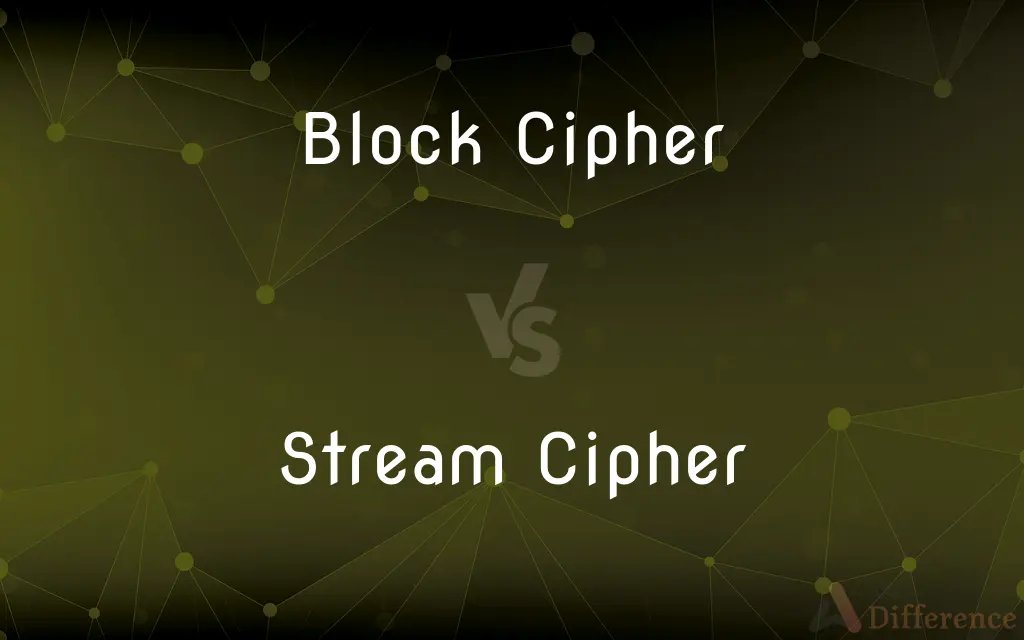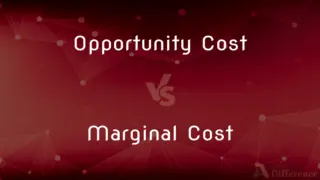Block Cipher vs. Stream Cipher — What's the Difference?
By Tayyaba Rehman — Published on January 15, 2024
Block Cipher encrypts data in fixed-size blocks, typically using complex transformations, while Stream Cipher encrypts data one bit or byte at a time, often with simpler operations.

Difference Between Block Cipher and Stream Cipher
Table of Contents
ADVERTISEMENT
Key Differences
Data Processing Method: Block Ciphers process data in fixed-size blocks (e.g., 64-bit or 128-bit). Stream Ciphers, conversely, encrypt data one bit or byte at a time, making them suitable for varying data lengths.
Complexity and Operations: Block Ciphers generally use more complex transformations and algorithms like substitution and permutation. Stream Ciphers use simpler operations, often involving XORing the plaintext with a generated key stream.
Key Usage: In Block Ciphers, the same key is used for each block, while in Stream Ciphers, the key stream can be unique for each encryption operation, enhancing security against certain attacks.
Error Propagation: Errors in Block Ciphers can affect the entire block, leading to more widespread data corruption. Stream Ciphers have limited error propagation, typically affecting only a single bit or byte.
Examples and Applications: AES (Advanced Encryption Standard) is a well-known Block Cipher, while RC4 is a commonly used Stream Cipher. Block Ciphers are used in disk encryption, while Stream Ciphers are often used in secure wireless communication.
ADVERTISEMENT
Comparison Chart
Data Processing
Encrypts fixed-size blocks
Encrypts data bit by bit or byte by byte
Complexity
More complex operations
Simpler operations, often XOR with key stream
Key Usage
Same key for each block
Unique key stream for each operation
Error Propagation
Errors affect entire block
Errors typically affect only single bits
Common Usage
Disk encryption, secure data storage
Wireless communication, real-time encryption
Compare with Definitions
Block Cipher
Can be more vulnerable to certain types of cryptanalysis.
Block ciphers need to be carefully designed to resist differential cryptanalysis.
Stream Cipher
Often uses simpler operations like XOR for encryption.
RC4, a stream cipher, uses XOR operations with a pseudo-random key stream.
Block Cipher
A block cipher encrypts data in fixed-size blocks using a symmetric key.
AES, a block cipher, is widely used for secure data encryption.
Stream Cipher
Provides limited error propagation in the encryption process.
An error in stream cipher encryption usually affects only a single bit.
Block Cipher
Utilizes substitution and permutation in its encryption process.
Block ciphers like DES use complex permutations for security.
Stream Cipher
Can adapt to encrypt data of any size or length.
Stream ciphers are flexible for varying lengths of data inputs.
Block Cipher
Suitable for encrypting large sets of data.
For encrypting files, block ciphers provide efficient and secure encryption.
Stream Cipher
Typically faster and use less memory than block ciphers.
Due to their efficiency, stream ciphers are used in many wireless communication protocols.
Block Cipher
Common block sizes are 64 bits and 128 bits.
Most modern block ciphers use a block size of 128 bits.
Stream Cipher
A stream cipher encrypts data one bit or byte at a time.
Stream ciphers are ideal for encrypting data streams in real-time.
Common Curiosities
What is a block cipher?
A block cipher is an encryption method that divides plaintext into fixed-size blocks and encrypts each block individually.
Are block ciphers suitable for real-time encryption?
Block ciphers can be used for real-time encryption but may not be as efficient as stream ciphers in some scenarios.
Is a stream cipher more secure than a block cipher?
Both have their strengths; stream ciphers can be more secure in real-time applications, while block ciphers are robust for static data encryption.
Is RC4 a block or a stream cipher?
RC4 is a stream cipher.
When should you use a block cipher?
Use a block cipher when dealing with large data sets where data size aligns with the cipher's block size.
Do block ciphers require more computational resources?
Generally, block ciphers require more computational power due to their complexity.
What is a stream cipher?
A stream cipher is an encryption method that encrypts plaintext one bit or byte at a time, often using a key stream.
Can block ciphers work in feedback modes?
Yes, block ciphers can operate in various feedback modes like CBC (Cipher Block Chaining) to encrypt data streams.
Can stream ciphers encrypt large files efficiently?
While possible, stream ciphers are better suited for continuous data streams rather than large, static files.
What's an example of a popular block cipher?
AES (Advanced Encryption Standard) is a widely used block cipher.
Do stream ciphers have error propagation issues?
Stream ciphers typically have limited error propagation, affecting only the bits where errors occur.
How do stream ciphers handle varying data lengths?
Stream ciphers can adapt to any data length, making them flexible for different sizes of input.
What makes block ciphers secure?
Block ciphers' security comes from their complex encryption algorithms and large key sizes.
Are AES and DES examples of block ciphers?
Yes, both AES and DES are examples of block ciphers.
Are stream ciphers used in wireless networks?
Yes, stream ciphers are commonly used in wireless networks due to their efficiency and adaptability.
Share Your Discovery

Previous Comparison
Fusion 360 vs. Blender
Next Comparison
Opportunity Cost vs. Marginal CostAuthor Spotlight
Written by
Tayyaba RehmanTayyaba Rehman is a distinguished writer, currently serving as a primary contributor to askdifference.com. As a researcher in semantics and etymology, Tayyaba's passion for the complexity of languages and their distinctions has found a perfect home on the platform. Tayyaba delves into the intricacies of language, distinguishing between commonly confused words and phrases, thereby providing clarity for readers worldwide.
















































